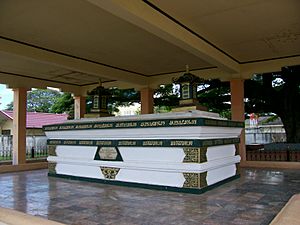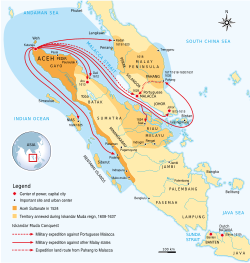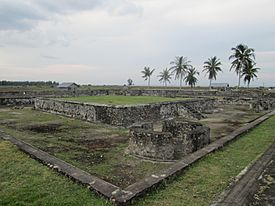Iskandar Muda facts for kids
Quick facts for kids Iskandar Muda |
|
|---|---|

Sultan Iskandar Muda's tomb in Banda Aceh
|
|
| Sulṭān of Acèh Darussalam | |
| Reign | 4 April 1607 – 27 December 1636 |
| Predecessor | Ali Ri'ayat Syah III |
| Successor | Iskandar Thani |
| Born | 1583 Banda Aceh, Aceh Sultanate (now Indonesia) |
| Died | 27 December 1636 Banda Aceh, Aceh Sultanate (now Indonesia) |
| Spouse | Kamaliah of Pahang (Putroe Phang) |
| Issue | Crown Prince Meurah Pupok Putri Sri Alam |
| House | Meukuta Alam |
| Father | Sultan Mansyur Syah |
| Mother | Puteri Raja Inderabangsa |
| Religion | Islam |
Iskandar Muda (born around 1583 – died 27 December 1636) was the twelfth Sulṭān of Acèh Darussalam. During his rule, the sultanate grew to its largest size. It became the strongest power and richest state in the western Indonesian islands and the Strait of Malacca. His name, "Iskandar Muda," means "young Alexander," and his military victories were often compared to those of Alexander the Great. Besides his many conquests, Aceh also became a major international hub for Islamic learning and trade during his time. He was the last Sultan of Aceh who was a direct male descendant of Ali Mughayat Syah, who founded the Aceh Sultanate. When Iskandar Muda died, the original ruling family of Aceh ended, and a new dynasty took over.
Contents
Early Life of Sultan Iskandar Muda
Iskandar Muda was born around 1593. His father was Mansur Syah, and his mother was Puteri Raja Inderabangsa. This meant he came from two important branches of the Acehnese royal family. Stories from that time, like the Hikayat Aceh, describe him as having many good qualities. He was also known by other names, especially Perkasa Alam.
Around 1605, he had a disagreement with his uncle, Sultan Ali Ri'ayat Syah III. He then went to Pidië, where another uncle, Husain, was a local ruler. Together, they planned a rebellion against Sultan Ali. Perkasa Alam led the troops from Pidië, but they refused to fight. Because of this, Perkasa Alam was put in prison by the sultan.
However, when the Portuguese attacked Aceh in 1606, he was released. He showed great bravery fighting against the invaders. The Portuguese were defeated and left, and Perkasa Alam gained much respect at court. When Sultan Ali suddenly died on 4 April 1607, Perkasa Alam quickly became sultan on the same day. He then removed his uncle Husain from power.
Conquests and Rule
Iskandar Muda's success came from his powerful military. His navy had large galleys with 600–800 men each. He also had cavalry with Persian horses, an elephant army, and many foot soldiers. His forces used over 2000 cannons and guns.
After becoming sultan, he began to take control of northern Sumatra. In 1612, he conquered Deli. In 1613, he took Aru and Johor. When Johor was conquered, its sultan and other royal family members were brought to Aceh. Some traders from the Dutch East India Company were also taken. However, Johor managed to push out the Acehnese soldiers later that year. Iskandar Muda was never able to keep permanent control over Johor. Johor then formed an alliance with other states against Aceh.
Iskandar Muda continued his campaigns. He defeated a Portuguese fleet at Bintan in 1614. In 1617, he conquered Pahang and brought its sultan to Aceh. This gave him a strong position on the Malayan peninsula. He then conquered Kedah in 1619, destroying its capital and moving its people to Aceh. A similar event happened in Perak in 1620, where 5,000 people were captured. He attacked Johor again in 1623 and took Nias in 1624/5.
At this point, Aceh's power was a serious threat to the Portuguese in Melaka. In 1629, he sent many ships to attack Melaka. This mission was a huge failure, with many ships and men lost. After this defeat, Iskandar Muda launched only two more sea trips. These were in 1630/1 and 1634, to stop rebellions in Pahang and strengthen Islam there. His sultanate kept control over northern Sumatra. However, it could not control the entire strait or expand to the rich pepper-producing area of Lampung.
Iskandar Muda was known for being very strict. He was harsh towards those who failed to please him. For example, generals who failed in their missions faced severe punishments. He also had his own son, Crown Prince Meurah Pupok, removed from his position. He then named his son-in-law, the son of the captured Sultan of Pahang, as his successor Iskandar Thani.
Economy and Administration
The sultanate's economy was based on the spice trade, especially pepper. The fights between Aceh, Johor, and Portuguese Malacca were mainly about controlling these valuable trading ports. Exports, encouraged by the Ottoman Sultans as an alternative route, added to the sultanate's wealth.
Iskandar Muda also made smart economic choices. He offered low interest rates and used small gold coins. However, like other sultanates, Aceh struggled to get enough food from farms in the countryside. One goal of Iskandar Muda's campaigns was to capture people who could be made to work on farms.
He was a strong leader who wanted to control trade. He made the royal court the main contact for foreigners. This allowed him to set important trade rules. He also made the legal system more predictable. He gathered a large fortune and built a powerful army.
One reason for Iskandar Muda's success was his ability to control the Acehnese elite, called the orang kaya ("powerful men"). Through the royal control of trade, he made sure they depended on him. The orang kaya had to attend court, where they could be watched. They were not allowed to build independent houses that could be used for military purposes.
He created a new group of nobles called “war leaders” (Malay language: hulubalang; Acehnese: uleëbalang). He gave them districts to rule. After his reign, however, these elites often supported weaker sultans to keep their own power. He also tried to replace local princes with royal officials called panglima. These officials had to report yearly and were regularly reviewed. An elite palace guard of 3,000 women was also formed.
Iskandar Muda also reformed the laws, creating a system of courts that used Islamic law. His system of law and administration became a model for other Islamic states in Indonesia.
Culture and Learning
During Iskandar Muda's rule, many important Islamic scholars came to Aceh. This made Aceh a major center for Islamic studies. Iskandar Muda supported the ideas of Sufi mystics like Hamzah Pansuri and Syamsuddin of Pasai. Both lived at the Aceh court. Their writings were translated into other Indonesian languages and had a big impact across the region. However, later, during the rule of Iskandar Thani, another scholar named Nuruddin ar-Raniri arrived. He said their ideas were wrong, and their books were ordered to be burned.
The historical story Hikayat Aceh ("The Story of Aceh") was likely written during Iskandar Muda's time. It tells the history of the sultanate and praises Iskandar Muda's youth. It was possibly inspired by the Persian Akbarnama, a book about the Mogul Emperor Akbar. The Hikayat Aceh said Iskandar Muda was a descendant of Iskandar Zulkarnain, also known as Alexander the Great. By saying this, the hikayat connected Aceh to the Malay world. Iskandar Zulkarnain was believed to be the ancestor of rulers in Melaka, Johor, Perak, and Pahang.
Legacy
Among the Acehnese people, Iskandar Muda is seen as a hero. He represents Aceh's past greatness. After his death, he was given the title Po Teuh Meureuhom, which means "Our Beloved Late Lord."
Several buildings and places in and near Banda Aceh are named after him. These include the Sultan Iskandarmuda Airport and Sultan Iskandar Muda Air Force Base. Kodam Iskandar Muda is the name of the military command that oversees Aceh Province.
Images for kids
 | John T. Biggers |
 | Thomas Blackshear |
 | Mark Bradford |
 | Beverly Buchanan |




